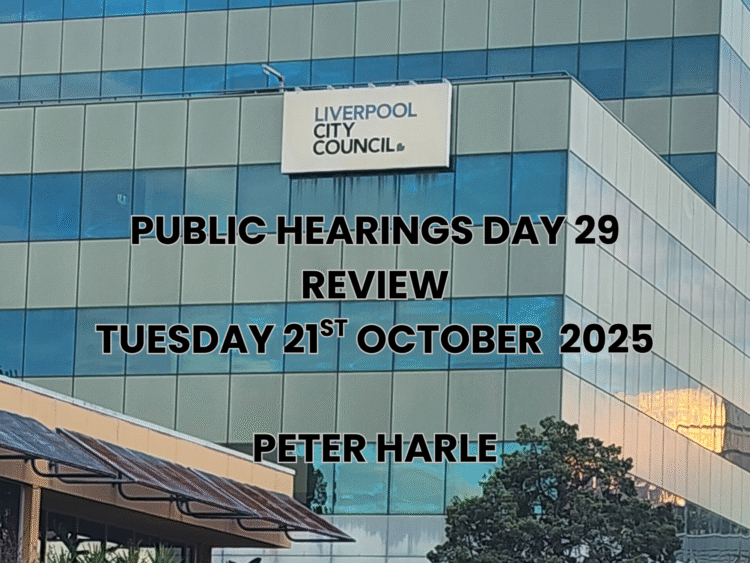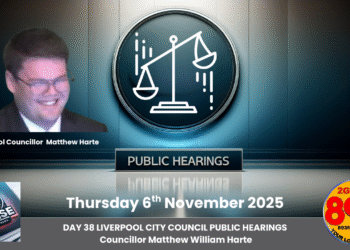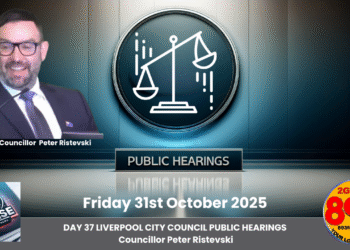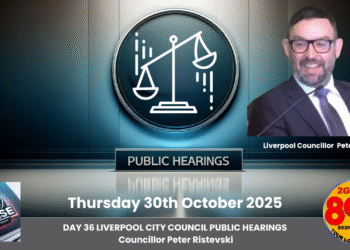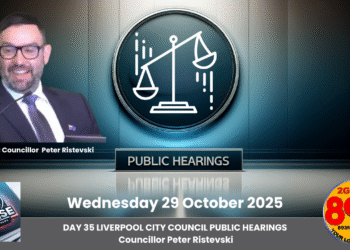Opening and Councillor Harle’s Testimony
- Re-Swearing and Background: The hearing began with Councillor Harle being re-sworn to continue his testimony from a previous session. He confirmed his 17-year tenure as a councillor and noted that he was no longer the deputy mayor, a position he held for a 12-month term ending on 24 September 2025.
- Deputy Mayor Election: Discussion centred on the election of the deputy mayor at the 24 September 2025 council meeting. Harle was nominated by other councillors and reluctantly accepted, despite initially believing Councillor Green should have been nominated. He voted for himself, a decision he later regretted, as he felt Councillor Green deserved the role. The voting resulted in a tie, with the mayor using a casting vote to decide the outcome.
Council Dynamics and Functionality
- Changing Dynamics: Harle described a decline in council functionality since January 2025, attributing it to a lack of cooperation among councillors and the polarising actions of a “rogue councillor,” identified as Councillor Ristevski. He cited instances of notices of motion not being seconded, indicating a breakdown in consensus.
- Notices of Motion Issues: Specific examples included a notice of motion by Councillor Ristevski regarding a $20,000 donation to a Lebanese humanitarian entity, which Harle deemed legally questionable and futile, as it lapsed due to lack of a seconder. He noted an increase in such lapsed motions (at least five in the current term), a rarity in previous terms.
- Attendance and Engagement: Harle expressed disappointment over councillors’ poor attendance at committee meetings and briefing sessions, which he believes hampers informed decision-making. He contrasted this with his own record of attending nearly all meetings over his tenure.
Key Decisions and Controversies
- CEO Termination Process: Harle discussed the council’s decisions in April, May, and June 2024 regarding the termination of CEO John Ajaka. He supported an initial investigation for procedural fairness in April but voted against the termination in May, believing the process (via a mayoral minute) was inappropriate. He co-authored a letter to the Minister for Local Government in June 2024, requesting administration due to dysfunctional decision-making.
- Property Purchases and Sales: The inquiry examined the council’s decision to purchase 600 Cowpasture Road as a depot site. Harle voted against it in August and November 2024, citing flooding risks, limited expansion potential, and proximity to existing depots. He also opposed a 50% increase in the waste levy to fund the purchase, deeming it unfair to ratepayers. Additionally, he supported a resolution not to sell properties like 3 Hoxton Park Road, arguing against disposing of income-producing public assets.
- Internal Ombudsman and Code of Conduct: Harle reflected on past internal ombudsman roles at the council, expressing reservations about impartiality when the role was held by a legal officer on the payroll. He also noted a significant rise in code of conduct complaints (around 170 currently), which he believes burdens ratepayers financially.
Social Media and Community Engagement
- Social Media Concerns: Harle criticised Councillor Ristevski’s social media activity for causing community backlash and council division. He mentioned personal derogatory comments affecting councillors’ mental health and re-election prospects, though he acknowledged the democratic nature of public criticism.
- Council Meetings and Conflicts: Several meetings saw conflicts of interest declarations due to ongoing inquiry matters, leading to adjournments (e.g., 24-25 September 2025). Harle adjusted his participation based on legal advice to avoid discussing inquiry-related evidence.
Matters Arising of Interest to Ratepayers: Are Ratepayers Getting Good Value for Money?
Ratepayers of Liverpool City Council are understandably concerned about whether their contributions are yielding effective governance and prudent financial management. The following matters from Day 29 of the inquiry highlight areas where value for money is in question:
- Financial Decisions and Property Management:
- 600 Cowpasture Road Purchase: Councillor Harle’s opposition to purchasing this property raises concerns about the council’s due diligence and financial planning. The decision to proceed, despite issues like flooding and limited access, coupled with a 50% waste levy increase to fund it, directly impacts ratepayers. Harle argued this increase was “unfair,” suggesting alternative funding methods could have been explored to lessen the burden on residents. Ratepayers may question if this $25 million investment (as initially floated) represents value when existing depots are nearby and expansion is constrained.
- Resistance to Asset Sales: Harle’s stance against selling income-producing assets like 3 Hoxton Park Road and the CT Lewis Centre reflects a long-term view of preserving council wealth for future generations. However, his description of budget adjustments as “fake” (anticipating sales that did not occur to show a surplus) raises alarms about transparency in financial reporting. Ratepayers may wonder if budget manipulations obscure the true financial health of the council, potentially affecting service delivery.
- Governance and Decision-Making Efficiency:
- Council Dysfunction: Harle’s testimony about declining functionality since January 2025, with poor attendance at critical meetings and briefing sessions, suggests that decision-making may be compromised. If councillors are not fully informed due to absenteeism, ratepayers may not be getting the robust governance they fund through rates. The frequent lapsing of notices of motion due to lack of support further indicates inefficiency, wasting time and resources.
- Code of Conduct Complaints: The dramatic increase in complaints (to around 170) is a significant cost to ratepayers, as Harle noted the financial burden of processing these. While he avoids filing complaints unless issues are “serious,” the volume suggests internal conflicts are diverting resources from community services. Ratepayers may question if their money is being spent on resolving councillor disputes rather than infrastructure or services.
- Community Representation and Accountability:
- Social Media and Public Perception: Harle’s concerns about derogatory social media comments and their impact on councillors highlight a disconnect between the council and the community. While he acknowledges the democratic right to criticise, the lack of effective counter-communication (beyond personal Facebook pages) may leave ratepayers misinformed about council actions. This raises the question of whether ratepayer-funded communication channels (like the council’s Facebook page) are being used effectively to ensure transparency and accountability.
- Deputy Mayor Election Process: The contentious election process, where Harle felt pressured to accept a nomination and regretted not supporting another councillor, suggests internal politics may overshadow merit-based decisions. Ratepayers may wonder if leadership roles are allocated to best serve the community or to satisfy political dynamics, potentially affecting governance quality.
- Procedural Fairness in Major Decisions:
- CEO Termination: Harle’s criticism of the process to terminate CEO John Ajaka, particularly the lack of procedural fairness and reliance on a mayoral minute, points to potential legal and financial risks for the council. If legal action or damages arise from such decisions, ratepayers bear the cost. His call for administration in June 2024 underscores deep governance issues, questioning whether current structures deliver value for money in managing key staff roles.
Conclusion
The Day 29 proceedings of the Public Inquiry into Liverpool City Council reveal significant challenges in governance, financial management, and community engagement that directly affect whether ratepayers are receiving good value for their money. Decisions like the Cowpasture Road purchase and associated levy hikes, coupled with budget transparency issues, suggest financial burdens may not align with community benefits. Internal dysfunction, high costs from code of conduct complaints, and procedural missteps in major decisions like the CEO termination further strain resources that could be directed to services. Ratepayers deserve assurance that their contributions fund effective, transparent, and community-focused governance, yet the evidence from this hearing indicates areas where value for money remains in doubt. As the inquiry continues, these matters warrant close attention to ensure accountability and improvement at Liverpool City Council.
Full Days Transcript Available Here









